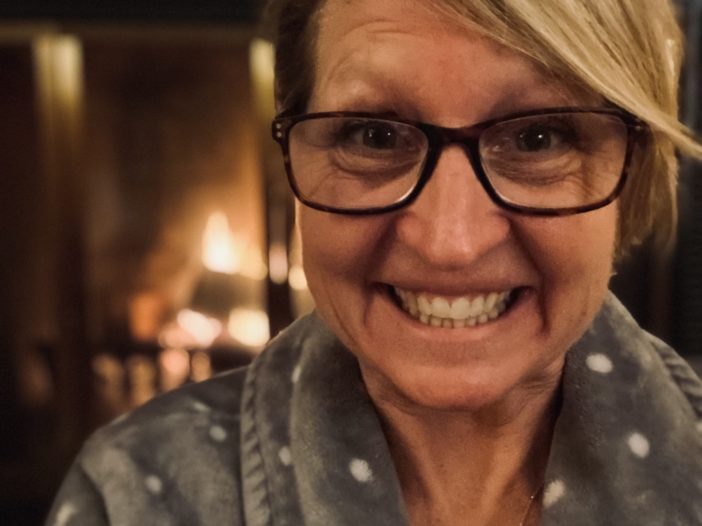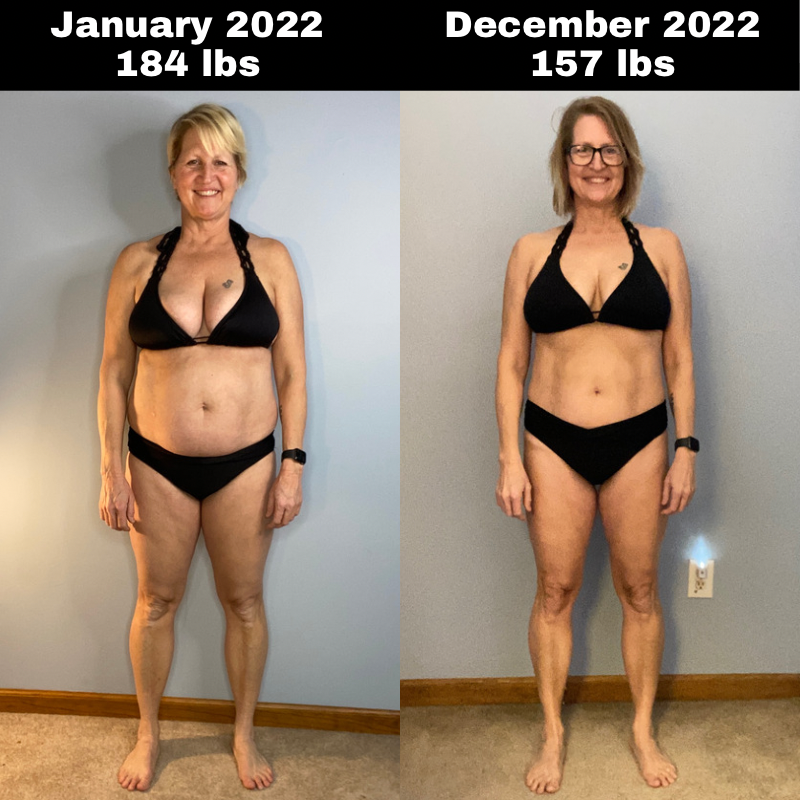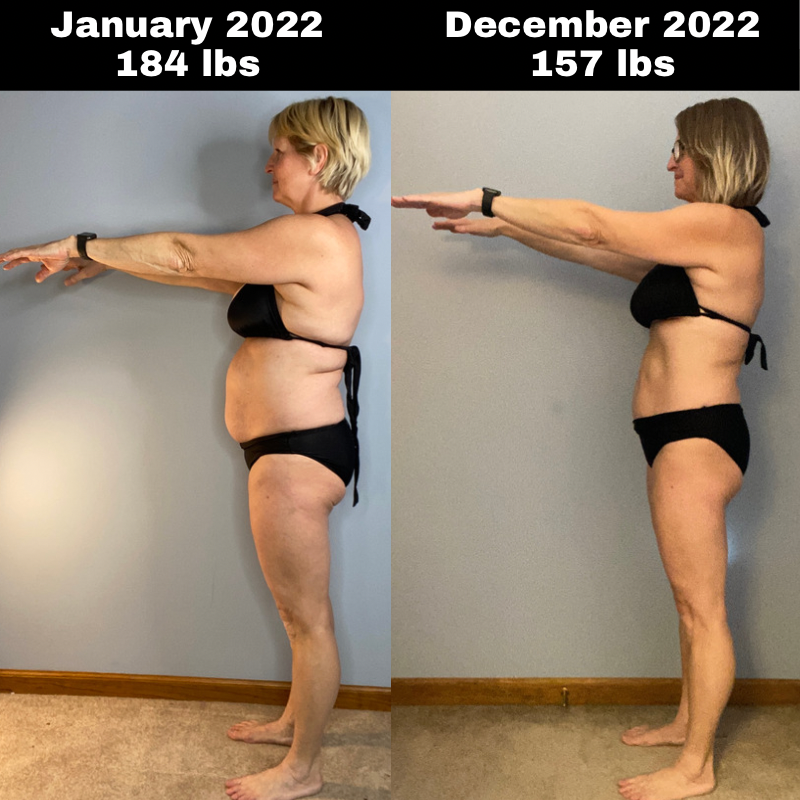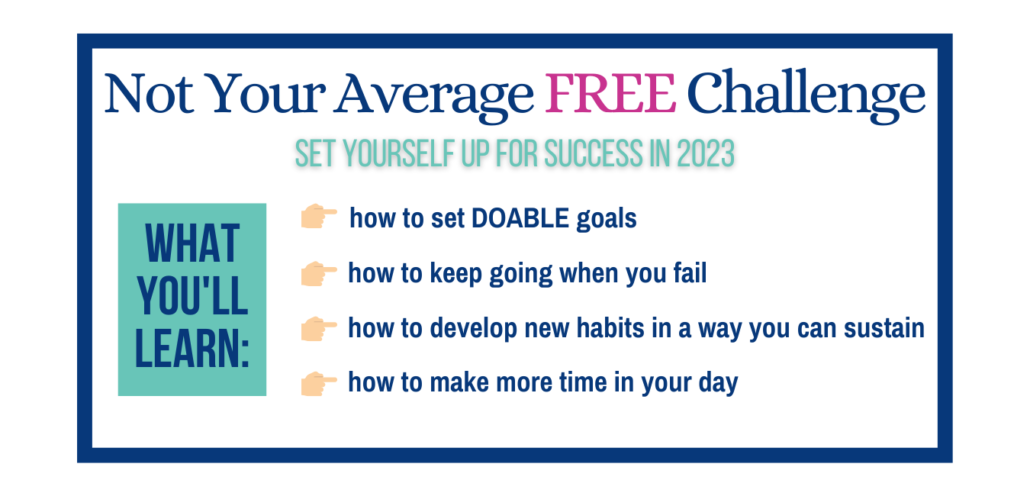
As we approach 2023, many of us will vow to change something about our lives.
We might set a goal.
Something like this:
I need to lose weight.
I want to be more organized.
I need to start exercising consistently.
I want to cut back on my expenses.
I need to get out of debt.
These are pretty vague, they don’t give you any direction or anything to shoot for, and they aren’t really even goals.
They are more thoughts.
You can’t measure them, so it’s also hard to see progress.
And when you can’t see progress you get discouraged really quickly.
I have a few goals for 2023.
In 2022 I lost 27 pounds.


My goal was to lose 35 pounds.
I didn’t quite hit my goal, but I made a lot of progress, I’m really proud of myself and I’m more motivated than ever to reach my ultimate goal weight of 139 pounds by the end of 2023.
So my goal for this year is to lose 18 pounds.
While 139 pounds is my goal weight, I realize that might not be the “right” number.
I may realize I’m where I want to be at 145 pounds.
I also want to add in much more consistent strength training in 2023, and when I do that, I’ll be carrying more muscle on my body than I am right now.
Losing fat but replacing some of it with muscle may result in actually gaining a few pounds.
So I’m also being flexible with my goal, and I’m using a few other goals to measure my progress and success, like how my clothes fit me and also my waist measurement.
My waist is currently 35″.
I want to get that down to 31″. That’s a healthier and physically more comfortable place for me to be in.
139 pounds and a 31″ waist are outcome goals. They are the results I want to have in 2023.
These goals give me direction, but that’s about it.
I can step on the scale every day or measure my waist every day or try on those jeans that are a little too tight and see how they fit every day, but that’s not going to help me make progress or have success.
But this is what so many of us focus on.
If you want to reach your outcome goal, you have to focus on the behaviors you need to consistently string together in order to get there.
You have to focus on the process and not the result.
So what does that mean?
Well, it means you think about the behaviors – or habits – you can start consistently doing.
What helps me lose weight?
- Drinking at least 80 ounces of water every day.
- Planning what I’m going to eat.
- Prepping food ahead of time.
- Allowing myself to feel hungry before I eat.
- Practicing portion control
- Paying attention to why I am eating.
- Eating in the kitchen or the dining room (not on the couch or in my bed).
- Eating three servings of veggies every day.
- Making sure I have healthy options available to me.
- Getting more than 6 hours of sleep every night.
I don’t do all of these things consistently.
In fact, I hardly did any of them really consistently in 2022, and some of them I didn’t do at all.
The biggest thing I practiced was allowing myself to experience hunger. I had started eating so often and for so many reasons other than being hungry that I didn’t even know when my body actually needed food.
I was eating when my brain wanted food, and that’s a lot different (for me anyway) than when my body needed it.
It took a long time for me to reset that. And I’m still working on it. I think I’ll always have to work on it.
But now I at least have an awareness of what I’m doing, and I’m able to determine if I’m actually hungry or if I’m emotionally uncomfortable and trying to distract myself with food.
So it was being more consistent with a new behavior that helped me make progress and move toward my goal.
That’s what it means to focus on the process.
Stepping on the scale every day focuses on the results.
Allowing yourself to actually get hungry (not ravenous, but hungry) focuses on the behaviors you need to practice in order to actually get the results you want.
When you are consistent with new behaviors, you get new results.
Because nothing changes is nothing changes.
Now that I’m used to eating when I’m hungry rather than eating when I’m upset/stressed/worried/angry/whatever, I’m ready to focus on some new behaviors in 2023.
My behavior goals are:
- drink at least 80 ounces of water a day (I’m at about 72 ounces consistently right now, so that’s leveling up a little but not too much)
- eating at least three servings of veggies every day
- planning what I’m going to eat for the day the night before
- looking at the schedule for the week making a meal plan that’s realistic and doable.
I’m not starting with all four of these new habits right off the bat.
I’m starting with the easiest one. Drinking water.
For January I want to keep track of how many days I drink at least 80 ounces of water.
I eventually want to be drinking closer to a gallon of water a day, but I know that’s way too big of a jump for me right now. I’m choosing a number that’s a little more than what I’m currently drinking.
I’m following the Goldilocks rule. Not too hard and not too easy.
Just right.
If I’m able to be successful with that 80% of the time, then I’ll think about being more consistent with veggies in February.
If I drink 80 ounces of water for 50% of January, then I’ll keep focusing just on the water and aim for at least 60% in February.
The more consistent I become with these habits – things that I want to be doing consistently for my overall health and not just for weight loss – the more likely I am to feel better physically, have success, and keep moving toward my goal weight.
If you have an outcome goal for 2023, what are the behaviors or habits you need to start implementing in order to have success?
Write them down and then pick ONE, and make that your behavior or habit goal. Make sure you’re starting at a place that’s manageble for you right now in this season of your life.
Keep track of how many days in January you are successful with that behavior.
At the end of the month, use that number to set a new behavior goal for February, and keep doing that every month of the year.
The more reps of this new habit you string together, the more momentum you’ll gain.
When you feel like you have a good handle on the first behavior you can think about stacking a new habit on top of that one.
You might be ready in February. You might need to focus on that one habit for the whole year.
You’ll learn and adjust as you go, and learn to enjoy the process of becoming the version of yourself you ultimately want to be.


Leave a Reply